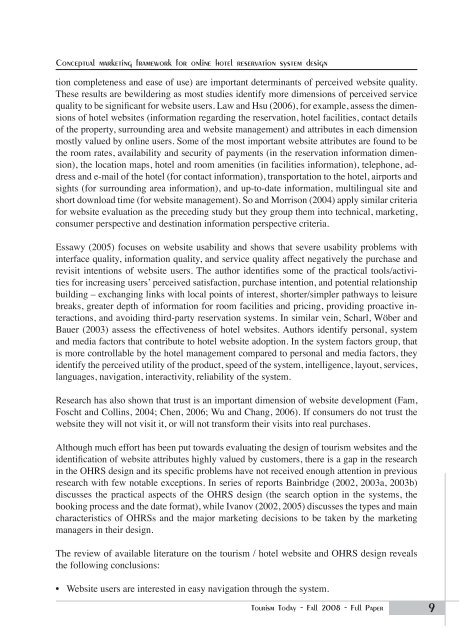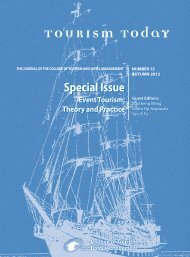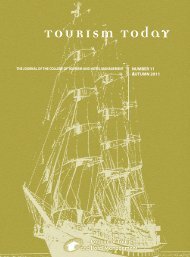Tourism Today - College of Tourism and Hotel Management
Tourism Today - College of Tourism and Hotel Management
Tourism Today - College of Tourism and Hotel Management
- TAGS
- tourism
- cothm.ac.cy
You also want an ePaper? Increase the reach of your titles
YUMPU automatically turns print PDFs into web optimized ePapers that Google loves.
Conceptual marketing framework for online hotel reservation system design<br />
tion completeness <strong>and</strong> ease <strong>of</strong> use) are important determinants <strong>of</strong> perceived website quality.<br />
These results are bewildering as most studies identify more dimensions <strong>of</strong> perceived service<br />
quality to be significant for website users. Law <strong>and</strong> Hsu (2006), for example, assess the dimensions<br />
<strong>of</strong> hotel websites (information regarding the reservation, hotel facilities, contact details<br />
<strong>of</strong> the property, surrounding area <strong>and</strong> website management) <strong>and</strong> attributes in each dimension<br />
mostly valued by online users. Some <strong>of</strong> the most important website attributes are found to be<br />
the room rates, availability <strong>and</strong> security <strong>of</strong> payments (in the reservation information dimension),<br />
the location maps, hotel <strong>and</strong> room amenities (in facilities information), telephone, address<br />
<strong>and</strong> e-mail <strong>of</strong> the hotel (for contact information), transportation to the hotel, airports <strong>and</strong><br />
sights (for surrounding area information), <strong>and</strong> up-to-date information, multilingual site <strong>and</strong><br />
short download time (for website management). So <strong>and</strong> Morrison (2004) apply similar criteria<br />
for website evaluation as the preceding study but they group them into technical, marketing,<br />
consumer perspective <strong>and</strong> destination information perspective criteria.<br />
Essawy (2005) focuses on website usability <strong>and</strong> shows that severe usability problems with<br />
interface quality, information quality, <strong>and</strong> service quality affect negatively the purchase <strong>and</strong><br />
revisit intentions <strong>of</strong> website users. The author identifies some <strong>of</strong> the practical tools/activities<br />
for increasing users’ perceived satisfaction, purchase intention, <strong>and</strong> potential relationship<br />
building – exchanging links with local points <strong>of</strong> interest, shorter/simpler pathways to leisure<br />
breaks, greater depth <strong>of</strong> information for room facilities <strong>and</strong> pricing, providing proactive interactions,<br />
<strong>and</strong> avoiding third-party reservation systems. In similar vein, Scharl, Wöber <strong>and</strong><br />
Bauer (2003) assess the effectiveness <strong>of</strong> hotel websites. Authors identify personal, system<br />
<strong>and</strong> media factors that contribute to hotel website adoption. In the system factors group, that<br />
is more controllable by the hotel management compared to personal <strong>and</strong> media factors, they<br />
identify the perceived utility <strong>of</strong> the product, speed <strong>of</strong> the system, intelligence, layout, services,<br />
languages, navigation, interactivity, reliability <strong>of</strong> the system.<br />
Research has also shown that trust is an important dimension <strong>of</strong> website development (Fam,<br />
Foscht <strong>and</strong> Collins, 2004; Chen, 2006; Wu <strong>and</strong> Chang, 2006). If consumers do not trust the<br />
website they will not visit it, or will not transform their visits into real purchases.<br />
Although much effort has been put towards evaluating the design <strong>of</strong> tourism websites <strong>and</strong> the<br />
identification <strong>of</strong> website attributes highly valued by customers, there is a gap in the research<br />
in the OHRS design <strong>and</strong> its specific problems have not received enough attention in previous<br />
research with few notable exceptions. In series <strong>of</strong> reports Bainbridge (2002, 2003a, 2003b)<br />
discusses the practical aspects <strong>of</strong> the OHRS design (the search option in the systems, the<br />
booking process <strong>and</strong> the date format), while Ivanov (2002, 2005) discusses the types <strong>and</strong> main<br />
characteristics <strong>of</strong> OHRSs <strong>and</strong> the major marketing decisions to be taken by the marketing<br />
managers in their design.<br />
The review <strong>of</strong> available literature on the tourism / hotel website <strong>and</strong> OHRS design reveals<br />
the following conclusions:<br />
• Website users are interested in easy navigation through the system.<br />
<strong>Tourism</strong> <strong>Today</strong> - Fall 2008 - Full Paper<br />
9





